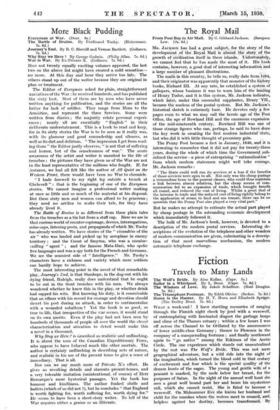More Black Pudding
Everyman at War. (Dent. 6s.) BAD not twenty equally exciting volumes appeared, the last two on the above list might have created a mild sensation— no more. At this day and hour they arrive too late. The others stand up out of the welter because they are original in plan or treatment.
The Editor of Everyman asked for plain, straightforward narratives of the War : he received hundreds, and has published the, sixty best. Most of them are by men who have never Written anything for publication, and the stories are all the better for lack of artifice. They range from Mons to the Armistice, and represent the three Services. Some were written from diaries ; the majority relate personal experi- ences ; nearly all are essentially " English " in their deliberate understatement. This is a book to read and keep, for in its sixty stories the War is to be seen as it really was, with its glamour and good comradeship and silences, as well as its dirt and delirium. " The impression I get from read- ing them " the Editor justly observes, " is not that of suffering and horror, but of the senselessness of war." The acute awareness of the artist and writer is unsuited to the life of trenches : the pictures they have given us of the War are not in the least representative of the millions who fought. If, for instance, we had all felt hie the author of All Quiet on the Western Front, there would have been no War to chronicle.
" I bade farewell to my right leg outside a trench at Gheluvelt " : that is the beginning of one of the Everyman stories. We cannot imagine a professional writer making at once so little and so much of the material at his disposal. But these sixty men and women can afford to be generous ; they need no artifice to make their tale, for they have already lived it.
The Battle of Brains is as different from these plain tales from the trenches as a tin hat from a staff cap. Here we are in that curious world of counter-espionage, decoys, interrogations, mine-saps, listening posts, and propaganda of which Mr. Tuohy has already written. We have stories of the " vivandPre of the air " who was landed and picked up by aeroplane in enemy territory ; and the Count of Smyrna, who was a cocaine- sniffing " agent " ; and the famous Mata-Hari, who spoke five languages and was a spy both for the French and Germans. We see the seamiest side of " Intelligence." Mr. Tuohy's characters have a richness and variety which mere -soldiers can hardly -hope to achieve.
The most interesting point in the novel of that remarkable play, Journey's End, is that Stanhope, in the dug-out with his dying friend, Raleigh, really does understand that he ought to be out in the front trenches with his men. We always wondered whether he knew this in the play, or whether drink had sapped his wits. But knowing his duty, is it conceivable that an officer with his record for courage and devotion should desert his post during an attack, in order to sentimentalize with a wounded subaltern ? Yet the book is so good, so true to life, that irrespective of the war scenes, it would stand on its own merits. Even if the play had- not been seen by hundreds of thousands of people all over the world the clever characterization and attention to detail would make this a novel in a thousand.
Why Stay we Here ? is described as realistic and unflinching. It is about the men of the Canadian Expeditionary Force, who appear to have behaved much like other mortals. The author is certainly unflinching in describing acts of nature, and realistic in his use of the present tense to give a sense of immediacy._ That is all.
Nor can we say much more of Private X's effort. He gives us revolting details and staccato present-tenses, and a very tolerable imitation (unintentional, of course) of Herr Remarque's more hysterical passages. Yet the book has humour and kindliness. The author hulked shells and bullets (which of us did not ?), but he concludes " that England is worth, fighting for, worth suffering for, worth dying for." He seems to have been a short-story writer. To tell of the War requires either a genius or an illiterate.




















































 Previous page
Previous page